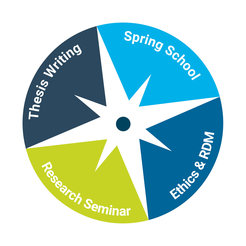Curriculum Compass

The IMPRS “Global Multiplicity” offers a structured programme designed to help doctoral researchers complete their work within the designated funding period. Its main goal is to equip doctoral candidates with the essential tools and support needed throughout their doctoral journey. Researchers in this programme join a dynamic community, gaining access to networking opportunities and an educational curriculum that enhances their thesis work. The programme requires 180 ECTS, encompassing research and thesis writing, ensuring that every element directly supports the doctoral project, creating a balanced and integrated learning experience.
1. Spring School
The annual Spring School, spanning seven to ten days in either March or April, serves as a platform that aims to provide doctoral researchers with both academic enrichment and social engagement. This comprehensive program unfolds in three distinct stages. One segment revolves around thematic group training, involving the participation of doctoral researchers alongside faculty and academic guests. During this phase, doctoral candidates present their project proposals or their fieldwork findings. The subsequent stages focus on writing workshops and training, allowing doctoral candidates to finalize and submit their project proposals or draft chapters to their Thesis Advisory Committee (TAC). Finally, the Spring School concludes with a series of lectures and seminars. These sessions explore cross-cutting themes facilitated by Teaching Faculty members, academics, and international guests, fostering a diverse and interdisciplinary academic exchange.
Learning outcomes:
- Familiarity with the IMPRS and its participating institutions
- Academic development through training sessions and informal interactions
- Development of research presentation skills
- Improved writing skills through collaborative practices
- Project proposal refinement (first-year researchers)
- Writing a thesis overview (third-year researchers)
- Interdisciplinary exposure though cross-cutting lectures
- Networking opportunities
2. Research Ethics and Data Management
The Ethics and Research Data Management (E & RDM) modules are designed to sensitise students to the manifold issues associated with ethical research conduct and the management of data. The module represents an essential part of the methodological training that students receive, and is central to the IMPRS goal of developing the professional capacities of our students in anthropology and related social science fields.
The module is tailored to the rhythm of ethnographic research, which is usually structured around long-term fieldwork. The module is thus divided into two three-day block sessions: the first takes place prior to field research, allowing students to prepare themselves for their time in the field. Doctoral researchers discuss ethical concerns associated with ethnographic research in general, and they learn to anticipate possible issues associated with their own project, including informed consent and issues of risk. Furthermore, they will be introduced to the main issues of research data management security and will receive technical training in how to organize, secure, backup, and otherwise manage data while conducting fieldwork.
The second part of the module takes place following fieldwork and is designed to allow students to reflect on their fieldwork experiences, begin to work with their data, and to prepare themselves for the transition to writing the dissertation. It reinforces data management plans, ensuring proper organization, documentation, storage, and long-term archiving while considering ethical obligations to research subjects. This part also discusses strategies of anonymization, the value of collaboration, and other non-conventional forms of communicating ethnographic research.
Both courses will take place in-person at the MPI in Halle and will be organized as block seminars.
Learning outcomes:
- Reflection on key ethical issues in ethnographic fieldwork and your own research
- Familiarity with the fundamentals of risk management in conducting ethnographic research
- Training in anonymization techniques
- Training in data security and data protection regulations
- Familiarity with the guidelines for good scientific practice from the Max Planck Society and relevant documents from the German Anthropological Association (DGSKA) and the German Research Foundation (DFG)
3. Research Seminar
The seminar aims to foster interdisciplinary collaboration and transversal thinking among researchers across thematic groups. The seminar delves into thematic topics in anthropology, offering advanced training on subjects like Justice, Infrastructures, Digitalization, and Urbanization. It encourages active involvement, facilitating in-depth knowledge, critical analysis, and academic writing skills through discussions with members of the Teaching Faculty.
Other seminars are designed as hands-on 'how-to' courses, focusing on research design, data coding, software support of anthropological research, and the practical application of anthropological methods in professional settings. These sessions are skill-oriented and aim to provide practical expertise that can be applied to research and professional practice.
These seminars take place at the MPI in Halle and combine online with in-person sessions.
Learning outcomes:
- Familiarity with current debates in anthropology
- Development of skills in critical analysis, academic writing, and discussion
- Enhancing researchers’ skill-set and professional profile
- Adapting anthropological ways of thinking and problem-solving to diverse professional settings
4. Writing a thesis: Research and Supervision
Ethnographic fieldwork holds a pivotal role within the curriculum of the research school as a cornerstone of research methodology. It serves as a crucial component where doctoral researchers engage in immersive, first-hand experiences within specific contexts to gather primary data, observe social phenomena, and understand cultural practices. Fieldwork allows students to apply theoretical frameworks learned in the classroom to real-world scenarios. It enables researchers to refine their ethnographic skills, conduct interviews, participant observations, and document practices, thus contributing to original insights and knowledge within the anthropological discipline.
Supervision entails a signed agreement with regular consultations, feedback, and support from the supervisor throughout the research phases. A Thesis Advisory Committee (TAC) oversees progress, meeting before fieldwork, after data collection, and annually, providing feedback and guidance. Thematic group colloquia offer platforms for discussing research proposals and drafts, receiving feedback from peers and teachers, with the frequency varying based on group size and format. Peer-to-peer support events like Spring Schools foster collaboration and a sense of community among researchers, encouraging regular interactions and support. The program includes international faculty and guest participation, enriching the curriculum through master classes, guest lectures, individual mentoring, and involvement in reading groups and seminars, both in-person and virtually, offering guidance and expertise to doctoral researchers.
